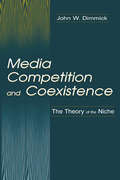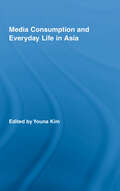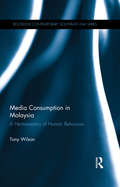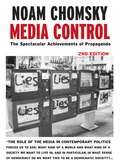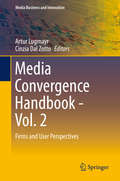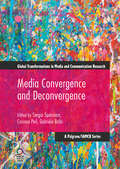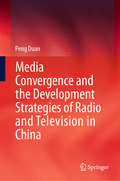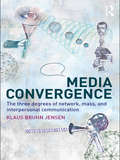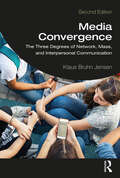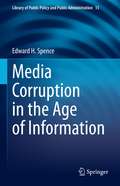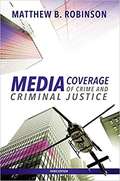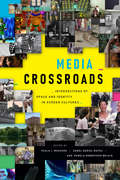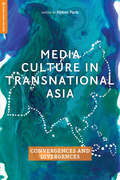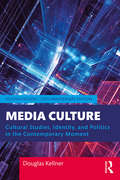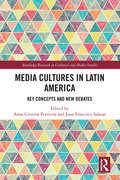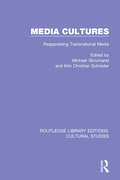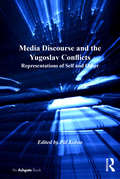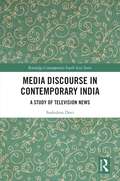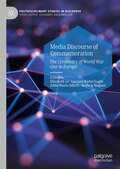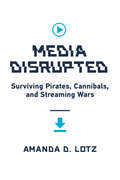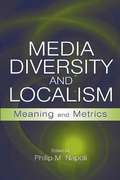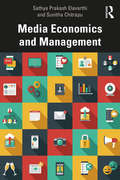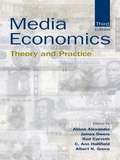- Table View
- List View
Media Compass: A Companion to International Media Landscapes
by Christian Pentzold Aljosha Karim SchapalsAn extensive and inclusive account of the media environments of 45 countries worldwide In Media Compass: A Companion to International Media Landscapes, an international team of prominent scholars examines both long-term media systems and fluctuating trends in media usage around the world. Integrating country-specific summaries and cross-cutting studies of geopolitical regions, this interdisciplinary reference work describes key elements in the political, social, demographic, cultural, and economic conditions of media infrastructures and public communication. Enabling the mapping of media landscapes internationally, Media Compass contains up-to-date empirical surveys of individual countries and regions, as well as cross-country comparisons of particular areas of public communication. 45 entries, each guiding readers from a general summary to a more in-depth discussion of a country’s specific media landscape, address formative conditions and circumstances, historical background and development, current issues and challenges, and more. Designed to facilitate quick lookup of individual entries, as well as comparative readings of a country’s position in the wider media environment, Media Compass: A Companion to International Media Landscapes is an invaluable addition to libraries and institutions of higher education, and a must-read volume for students, educators, scholars, and practitioners working in communication and media studies, journalism, and media production.
Media Competition and Coexistence: The Theory of the Niche (Routledge Communication Series)
by John W. DimmickThis volume considers how media firms, as well as entire industries, exist and persist over time despite what often seems to be intense competition for such resources as audiences and advertisers. Addressing competition within and among media organizations and industries, including broadcasting, cable, and the Internet, author John W. Dimmick studies the media industries through the niche theory lens, developed by bioecologists to explain competition and coexistence. He examines the targets of the different media--audience, advertisers, money--and how they compete, using examples from a variety of studies. Each chapter incorporates relevant economic constructs into the analytic framework. This approach includes the use of economics of scale to explain selection and firm mortality in newspapers and movie theaters; the application of the transaction costs concept to explicate the rise of advertising agencies; the employment of the strategic group concept in analyzing the niche breadth strategy; and the measurement of gratifications-utilities. A comprehensive overview of the determinants of media competition and coexistence, Media Competition and Coexistence: The Theory of the Niche offers unique insights for scholars, students, researchers, and practitioners in media economics, management, and business.
Media Consumption and Everyday Life in Asia (Routledge Advances in Internationalizing Media Studies #Vol. 1)
by Youna KimThis book explores people’s everyday experience of the media in Asian countries in confrontation with huge social change and transition and the need to understand this phenomenon as it intersects with the media. It argues for the centrality of the media to Asian transformations in the era of globalization. The profusion of the media today, with new imaginations, new choices and contradictions, generates a critical condition for reflexivity engaging everyday people to have a resource for the learning of self, culture and society in a new light. Media culture is creating new connections, new desires and threats, and the identities of people are being reworked at individual, national, regional and global levels. Within historically specific social conditions and contexts of the everyday, the chapters seek to provide a diversity of experiences and understandings of the place of the media in different Asian locations. This book considers the emerging consequences of media consumption in people’s everyday life at a time when the political, socio-economic and cultural forces by which the media operate are rapidly globalizing in Asia.
Media Consumption and Everyday Life in Asia (Routledge Advances in Internationalizing Media Studies)
by Youna KimThis book explores people’s everyday experience of the media in Asian countries in confrontation with huge social change and transition and the need to understand this phenomenon as it intersects with the media. It argues for the centrality of the media to Asian transformations in the era of globalization. The profusion of the media today, with new imaginations, new choices and contradictions, generates a critical condition for reflexivity engaging everyday people to have a resource for the learning of self, culture and society in a new light. Media culture is creating new connections, new desires and threats, and the identities of people are being reworked at individual, national, regional and global levels. Within historically specific social conditions and contexts of the everyday, the chapters seek to provide a diversity of experiences and understandings of the place of the media in different Asian locations. This book considers the emerging consequences of media consumption in people’s everyday life at a time when the political, socio-economic and cultural forces by which the media operate are rapidly globalizing in Asia.
Media Consumption in Malaysia: A Hermeneutics of Human Behaviour (Routledge Contemporary Southeast Asia Series)
by Tony WilsonHow do visitors immersing themselves in material places such as shopping malls or video sites online make sense of the experience, enabling criticizing - or consenting to content? How is this evident in behaviour? Reflecting on accounts by Chinese, Indian, Malay and Indigenous members of Malaysian society, this book addresses these questions from a practices perspective increasingly adopted by scholars in marketing and media studies. The volume provides an account of practices theory from its origins in critical hermeneutics (such as Heidegger, Gadamer and Ricoeur), as reflecting on the processes of embodied understanding, developing alongside interpretive and reception theory. Part I draws upon authors as diverse as Heidegger and Henry Jenkins, with a practices perspective on media and mall consuming shown as developing from forty years of theorizing about audience activity. An empirical study of Malaysian blogging and branding on YouTube exemplifies this approach. Part II considers Malaysians absorbed in social media sites, as everyday visitors and the subjects of consumer research. The book then returns to the material world, exploring the horizons of understanding from which Malaysians enter their mediated malls, and concludes by positioning media practices theory within a spectrum of philosophical ideas. Recognizing the current (re)turn in Consumer and Media Studies to employing hermeneutics as an account of our embodied human understanding, this book presents its major philosophical proponents, showing how close attention to their writing can now inform and shape research on ubiquitous screen users. As such, it will be of particular interest to students and scholars of Media Studies, Asian Studies and Marketing Studies.
Media Control: The Spectacular Achievements of Propaganda (Open Media Series)
by Noam ChomskyNoam Chomsky's backpocket classic on wartime propaganda and opinion control begins by asserting two models of democracy--one in which the public actively participates, and one in which the public is manipulated and controlled. According to Chomsky, "propaganda is to democracy as the bludgeon is to a totalitarian state," and the mass media is the primary vehicle for delivering propaganda in the United States. From an examination of how Woodrow Wilson's Creel Commission "succeeded, within six months, in turning a pacifist population into a hysterical, war-mongering population," to Bush Sr.'s war on Iraq, Chomsky examines how the mass media and public relations industries have been used as propaganda to generate public support for going to war. Chomsky further touches on how the modern public relations industry has been influenced by Walter Lippmann's theory of "spectator democracy," in which the public is seen as a "bewildered herd" that needs to be directed, not empowered; and how the public relations industry in the United States focuses on "controlling the public mind," and not on informing it. Media Control is an invaluable primer on the secret workings of disinformation in democratic societies.
Media Convergence Handbook - Vol. 1
by Artur Lugmayr Cinzia Dal ZottoThe Media Convergence Handbook sheds new light on the complexity of media convergence and the related business challenges. Approaching the topic from a managerial, technological as well as end-consumer perspective, it acts as a reference book and educational resource in the field. Media convergence at business level may imply transforming business models and using multiplatform content production and distribution tools. However, it is shown that the implementation of convergence strategies can only succeed when expectations and aspirations of every actor involved are taken into account. Media consumers, content producers and managers face different challenges in the process of media convergence. Volume I of the Media Convergence Handbook encourages an active discourse on media convergence by introducing the concept through general perspective articles and addressing the real-world challenges of conversion in the publishing, broadcasting and social media sectors.
Media Convergence and Deconvergence (Global Transformations in Media and Communication Research - A Palgrave and IAMCR Series)
by Corinna Peil Sergio Sparviero Gabriele BalbiThis edited volume explores different meanings of media convergence and deconvergence, and reconsiders them in critical and innovative ways. Its parts provide together a broad picture of opposing trends and tensions in media convergence, by underlining the relevance of this powerful idea and emphasizing the misconceptions that it has generated. Sergio Sparviero, Corinna Peil, Gabriele Balbi and the other authors look into practices and realities of users in convergent media environments, ambiguities in the production and distribution of content, changes to the organization of media industries, the re-configuration of media markets, and the influence of policy and regulations. Primarily addressed to scholars and students in different fields of media and communication studies, Media Convergence and Deconvergence deconstructs taken-for-granted concepts and provides alternative and fresh analyses on one of the most popular topics in contemporary media culture.Chapter 1 is available open access under a CC BY 4.0 license at link.springer.com
Media Convergence and the Development Strategies of Radio and Television in China
by Peng DuanThis book discusses the development strategies of Chinese media convergence in the current, fast-changing communication environment. Drawing on both theoretical and empirical data and based on the author’s observations, focus groups, and in-depth analyses of selected Chinese radio and TV networks, it illustrates key lessons for the maintenance and future improvement of talents, advertisement, media organization management, business development, and coping strategies. Further, it outlines a framework that helps readers to consider how to use communication strategies for the construction of media convergence in the context of China by referring to theories of international communication and political communication.Presenting research on the development strategies of Chinese media convergence, it offers a systematic study of the processes through which the Chinese radio and television industries make use of proper communication strategies to have a profound global influence.
Media Convergence: The Three Degrees of Network, Mass and Interpersonal Communication
by Klaus Bruhn JensenThe development of digital media presents a unique opportunity to reconsider what communication is, and what individuals, groups, and societies might hope to accomplish through new as well as old media. At a time when digital media still provoke both utopian and dystopian views of their likely consequences, Klaus Bruhn Jensen places these ‘new’ media in a comparative perspective together with ‘old’ mass media and face-to-face communication, restating the two classic questions of media studies: what do media do to people, and what do people do with media? Media Convergence makes a distinction between three general types of media: the human body enabling communication in the flesh; the technically reproduced means of mass communication; and the digital technologies facilitating interaction one-to-one, one-to-many, as well as many-to-many. Features include: case studies, including mobile phones in everyday life, the Muhammad cartoons controversy and climate change as a global challenge for human communication and political action diagrams, figures, and tables summarizing key concepts beyond standard ‘models of communication’ systematic cross-referencing. Major terms are highlighted and cross-referenced throughout, with key concepts defined in margin notes.
Media Convergence: The Three Degrees of Network, Mass, and Interpersonal Communication
by Klaus Bruhn JensenThis second edition furthers conversations about the ongoing society-wide and worldwide digitalization of human communication. Reviewing the long lines in the history of media and communication – from writing via printing and broadcasting to computing – the book lays out three general types of media: the human body enabling face-to-face communication here and now; the technically reproduced means of mass communication across space and time; and the digital technologies integrating one-to-one, one-to-many, as well as many-to-many interactions. All these communicative practices coexist in contemporary media environments. Across cultures, genders, and age groups, people go on communicating in the flesh, via wires, and over the air, as illustrated though case studies of mobile communication on mundane matters, and of climate change as a global challenge for human communication and coexistence. The second edition includes: Updated accounts of research and public debate on digital media and communication Analyses of current social media and an emerging internet of things Systematic presentations of digital as well as traditional empirical methods Discussion of the normative implications of digitalization, including the classic rights of information and communication, and a right not to be communicated about through surveillance Interdisciplinary in scope to showcase the wide-reaching cultural consequences of media convergence, this book is ideal for advanced undergraduate students, graduate students, and scholars in the fields of media, communication, and cultural studies.
Media Corruption in the Age of Information (Library of Public Policy and Public Administration #15)
by Edward H. SpenceThis book provides an applied model of corruption to identify, analyse, and assess the ethics of major types of corruption in the media involving practices such as cash-for-comment, media release journalism, including video news releases (VNRs), fake news, deep fakes, and staged news. The book starts with a conceptual philosophical analysis of corruption in general, followed by an in-depth analysis of media corruption, across its various transformations, from the legacy media of the 4th Estate (e.g. The UK Guardian) to the digital media of the 5th Estate (e.g. Social Media and Wikileaks) to the Network Media of the 6th Estate (e.g. Facebook and Google), and provides key case studies as practical illustrations and contextualisation of those major types of media corruption. It explains how the conversion of the two forms of media communication, corporate and social digital communication, as expressed in the symbiotic relationship between the 4th Estate and the 5th Estate exposes and enables the reporting of corruption, signalling a major shift in the way the media itself can provide an effective means for anti-corruption measures against major practices of corruption that would have otherwise gone unnoticed.
Media Coverage of Crime and Criminal Justice
by Matthew B. RobinsonMedia Coverage of Crime and Criminal Justice critically examines the media to identify how crime and criminal justice are treated in the news, entertainment, and infotainment media. The book sheds light on important realities of crime and criminal justice and corrects major misconceptions created by coverage of crime and criminal justice in the media. While there are other texts on the market focused on the impact of mass media on criminal justice, this text is the only one that starts with the issue of corporate ownership of the mass media as a problem for gaining an accurate understanding of the realities of crime and criminal justice. <P><P> The third edition updates the second with the latest studies focusing on media coverage of crime, police, courts, and corrections, with an expansive new section on media coverage of capital punishment. Further, studies and examinations of entertainment media (e.g., television shows, movies) are incorporated into this new edition. Unique among media books, the author presents basic information about the media in the introductory chapters and then applies this information to specific issues of crime and criminal justice in the rest of the book. By focusing on the same issues and themes throughout, learning of key concepts is furthered as they are applied to real-world media. The book addresses media coverage of law-making and crime, policing, courts, and corrections, as well as how the media both help and hinder effective crime control and crime prevention efforts.
Media Crossroads: Intersections of Space and Identity in Screen Cultures
by Paula J. Massood, Angel Daniel Matos, and Pamela Robertson WojcikThe contributors to Media Crossroads examine space and place in media as they intersect with sexuality, race, ethnicity, age, class, and ability. Considering a wide range of film, television, video games, and other media, the authors show how spaces—from the large and fantastical to the intimate and virtual—are shaped by the social interactions and intersections staged within them. The highly teachable essays include analyses of media representations of urban life and gentrification, the ways video games allow users to adopt an experiential understanding of space, the intersection of the regulation of bodies and spaces, and how style and aesthetics can influence intersectional thinking. Whether interrogating the construction of Portland as a white utopia in Portlandia or the link between queerness and the spatial design and gaming mechanics in the Legend of Zelda video game series, the contributors deepen understanding of screen cultures in ways that redefine conversations around space studies in film and media.Contributors. Amy Corbin, Desirée J. Garcia, Joshua Glick, Noelle Griffis, Malini Guha, Ina Rae Hark, Peter C. Kunze, Paula J. Massood, Angel Daniel Matos, Nicole Erin Morse, Elizabeth Patton, Matthew Thomas Payne, Merrill Schleier, Jacqueline Sheean, Sarah Louise Smyth, Erica Stein, Kirsten Moana Thompson, John Vanderhoef, Pamela Robertson Wojcik
Media Culture in Transnational Asia: Convergences and Divergences (Global Media and Race)
by John Gagnon Hamid Abdollahyan Asantha U. Attanayake W. Michelle Wang Maya Dodd Hyesu Park Rea Amit Shubhda Arora Juhi Jotwani Dorothy Wai Lau Hiroki Yamamoto Sabiha Huq Darlene Machell Espena Alireza Dehghan Hoornaz KeshavarzianMedia Culture in Transnational Asia: Convergences and Divergences examines contemporary media use within Asia, where over half of the world’s population resides. The book addresses media use and practices by looking at the transnational exchanges of ideas, narratives, images, techniques, and values and how they influence media consumption and production throughout Asia, including: Sri Lanka, Bangladesh, South Korea, Singapore, Vietnam, Afghanistan, Iran and many others. The book’s contributors are especially interested in investigating media and their intersections with narrative, medium, technologies, and culture through the lenses that are particularly Asian by turning to Asian socio-political and cultural milieus as the meaningful interpretive framework to understand media. This timely and cutting-edge research is essential reading for those interested in transnational and global media studies.
Media Culture: Cultural Studies, Identity and Politics in the Contemporary Moment
by Douglas KellnerIn this thorough update of one of the classic texts of media and cultural studies, Douglas Kellner argues that mediated culture is now the dominant form of culture which socializes us and provides and plays major roles in the economy, polity, and social and cultural life. The book includes a series of lively studies that both illuminate contemporary culture and society, while providing methods of analysis, interpretation, and critique to engage contemporary U.S. culture. Many people today talk about cultural studies, but Kellner actually does it, carrying through a unique mixture of theoretical analysis and concrete discussions of some of the most popular and influential forms of contemporary media culture. Studies cover a wide range of topics including: Reagan and Rambo; horror and youth films; women’s films, the TV-series Orange is the New Black and Hulu’s TV series on Margaret Atwood’s The Handmaid’s Tale; the films of Spike Lee and African-American culture; Latino films and cinematic narratives on migration; pop female icons Madonna, Beyoncé, and Lady Gaga; fashion and celebrity; television news, documentary films, and recent work of Michael Moore; fantasy and science fiction, with focus on the cinematic version of Lord of the Rings, Philip K. Dick and the Blade Runner films, and the work of David Cronenberg. Situating the works of media culture in their social context, within political struggles, and the system of cultural production and reception, Kellner develops a multidimensional approach to cultural studies that broadens the field and opens it to a variety of disciplines. He also provides new approaches to the vexed question of the effects of culture and offers new perspectives for cultural studies. Anyone interested in the nature and effects of contemporary society and culture should read this book.
Media Cultures in Latin America: Key Concepts and New Debates (Routledge Research in Cultural and Media Studies)
by Anna Cristina Pertierra Juan Francisco SalazarMedia Cultures in Latin America updates and expands contemporary global understandings of the region’s media and cultural research. Drawing on forty years of contributions made by Latin American cultural studies to the global media research, the book connects this history to newly developing work that has yet to be given deep consideration in anglophone scholarship. The authors emphasise themes that are key to media and cultural scholarship: distinctive from other world regions, these intellectual debates have been central to how media and communication is studied and produced in Latin America. This approach provides students and scholars with a better framework for engaging with Latin American research beyond the specificities of just one place or one kind of cultural product or technology. The book is an essential read for upper level undergraduate and postgraduate students of media studies, anthropology, cultural studies, communication studies, and Latin American studies. It will also be of interest to students and scholars learning about human rights, environmental, indigenous and political activism.
Media Cultures: Reappraising Transnational Media (Routledge Library Editions: Cultural Studies)
by Michael Skovmand Kim Christian SchrøderThis book, first published in 1992, challenges the elitism and cultural pessimism of much Anglo-American and Continental cultural debate with regard to the role and power of transnational media practices. In a series of ten innovative essays, an international group of media researchers explores a wide range of cultural practices across national borders and the cultural politics associated with these everyday practices and debates.
Media Discourse and the Yugoslav Conflicts: Representations of Self and Other
by Pål KolstøIn spite of the growing literature on discourse analysis, the relationship of discourse to violent/non-violent outcomes of conflict is an under-researched area. This book combines theories on ethnic conflict, identity construction and discourse analysis with a comprehensive and inclusive survey of the countries of the former Yugoslavia. It presents an understanding of the interrelationship between 'words' and 'deeds' grounded through an extensively close analysis of film, television and newspapers samples taken from the period. This combination of ground-breaking applications of theory with detailed empirical case studies will make Media Discourse and the Yugoslav Conflicts of key interest to scholars across a range of social sciences including sociology, discourse analysis, media, conflict and peace studies as well as those concerned with ethnopolitical conflict.
Media Discourse in Contemporary India: A Study of Television News (Routledge Contemporary South Asia Series)
by Sudeshna DeviThis book examines the historical trajectory of the growth of the television news and critically analyzes the role of private television news in framing the nature of public discourse in contemporary India. Set in the context of a transformed media landscape, the book attempts to understand and analyze the role of two private national news channels, NDTV 24×7 and Aaj Tak, in producing mediatized narratives that offer a commentary on the various social, political, cultural, religious and economic issues in the public domain. This is achieved by critically examining the process and techniques of production, representation and consumption of current affairs programs such as studio debates, panel discussions, audience talk shows and documentaries aired on both the channels. Highlighting some of the key trends that impinge on the structure and mode of operation of television news media in contemporary India, the book offers a simultaneous examination of how the production, representation and consumption of the mediatized discourses shape the nature of public discourse and have social-political ramifications for the functioning of Indian democracy. The book will be of interest to researchers in sociology, media and communication studies, popular culture and South Asian Studies.
Media Discourse of Commemoration: The Centenary of World War One in Europe (Postdisciplinary Studies in Discourse)
by Hedwig Wagner Elisabeth Le Luciana Radut-Gaghi Alida Maria SillettiThis book explores how First World War commemoration events are presented, reported and mediated on the websites of mainstream daily newspapers from seven European countries. The book is the result of a research group – DIREPA-EUROPE (Discours, représentations, passé de l’Europe), part of Lemel research network – characterized by a shared interest in media discourse and online newspapers. It presents a fluid analysis chain on the commemoration discourse generated by the WWI Armistice Centenary in 2018, and will be of interest not only to scholars of discourse and media studies, but also of European history, cultural memory, journalism and conflict studies.
Media Disrupted: Surviving Pirates, Cannibals, and Streaming Wars
by Amanda D. LotzHow the internet disrupted the recorded music, newspaper, film, and television industries and what this tells us about surviving technological disruption.Much of what we think we know about how the internet "disrupted" media industries is wrong. Piracy did not wreck the recording industry, Netflix isn't killing Hollywood movies, and information does not want to be free. In Media Disrupted, Amanda Lotz looks at what really happened when the recorded music, newspaper, film, and television industries were the ground zero of digital disruption. It's not that digital technologies introduced "new media," Lotz explains; rather, they offered existing media new tools for reaching people. For example, the MP3 unbundled recorded music; as the internet enabled new ways for people to experience and pay for music, the primary source of revenue for the recorded music industry shifted from selling music to licensing it. Cable television providers, written off as predigital dinosaurs, became the dominant internet service providers. News organizations struggled to remake businesses in the face of steep declines in advertiser spending, while the film industry split its business among movies that compelled people to go to theaters and others that are better suited for streaming. Lotz looks in detail at how and why internet distribution disrupted each industry. The stories of business transformation she tells offer lessons for surviving and even thriving in the face of epoch-making technological change.
Media Diversity and Localism: Meaning and Metrics (Routledge Communication Series)
by Philip M. NapoliQuestions concerning the quality of media performance and the effectiveness of media policymaking often revolve around the extent to which the media system fulfills the values inherent in diversity and localism principles. This edited volume addresses challenges and issues relating to diversity in local media markets from a media law and policy perspective. Editor Philip M. Napoli provides a conceptual and empirical framework for assessing the success/failure of media markets and media outlets in fulfilling diversity and localism objectives. Featuring well-known contributors from a variety of disciplines, including media, law, political science, and economics, Media Diversity and Localism explores the following topics:*media ownership and media diversity and localism;*conceptual and methodological issues in assessing media diversity and localism;*minorities, media, and diversity; and*contextualizing media diversity and localism: audience behavior and new technologies. This substantive and timely volume speaks to scholars and researchers in the areas of media law and policy, political science, and all others interested in media regulation. It can also be used in a graduate seminar on media policy topics.
Media Economics and Management
by Sathya Prakash Elavarthi Sunitha ChitrapuThis book offers a comprehensive understanding of key concepts and terms in media economics and management and explains their applications using relevant data. Beginning with a conceptual study of media markets, industry structures, firm behaviour, public policy, production, pricing and consumption choices in media industries, the book uses the framework to present an in-depth examination of the management of four major media industry sectors in India: newspaper publishing, television broadcasting, film and digital media industries. It also deals with two topics relevant across media business sectors: creative industries approaches and copyright issues. The book discusses the economic forces and factors that shape the workings of media industries and institutions in India to highlight trends in a business that is rapidly evolving, highly profitable and marked by regional, linguistic, economic and cultural diversity. This volume is a step towards formalising the emerging field of media economics and management within the discipline of mass communication and journalism as an area of research and education in India. An accessible guide to the basic principles and concepts of media economics and management, with illustrations from Indian and global media industries, this will be an essential resource for students, researchers and teachers of media and communication studies, media economics and management, political economy and sociology as well as for professionals in media industries.
Media Economics: Theory and Practice (Routledge Communication Series)
by Alison Alexander Rod Carveth C. Ann Hollifield Albert N. Greco James OwersMedia Economics: Theory and Practice focuses on the basic principles of economics in the business sector and applies them to contemporary media industries. This text examines the process of media economics decision making through an exploration of key topics, such as industrial restructuring, regulatory constraints upon media operations, and changing economic value, providing key insights into media business activities. With the structure and value of media industries changing rapidly and sometimes dramatically, this text moves beyond a basic documentation of historical patterns to help readers understand the mechanics of change, offering insight into the processes reproducing contemporary trends in media economics. Thoroughly updated in this third edition, Media Economics focuses on the primary concerns of media economics, the techniques of economic and business analysis, and the overall characteristics of the media environment; and explores contemporary business practices within specific media industries, including newspaper, magazine, television, cable, movie, radio advertising, music, and online industries. New for this edition are chapters on the advertising, book publishing, and magazine publishing industries. Chapters contributed by expert scholars and researchers provide substantial discussions of the crucial topics and issues in the media industry sectors, and emphasize both domestic and international businesses. Offering a thorough examination of the economic factors and forces concerning the media industries, Media Economics is appropriate for use as a course text for advanced media management and economics students. It also serves as an indispensable reference for scholars and researchers in media business arenas.

